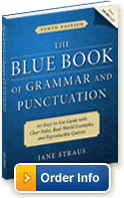|
Hi, Friend.
Welcome to your GrammarBook.com E-Newsletter.

"I would just like to thank you for your Grammar Book newsletters. They are always so helpful!"
- Rae G.
"My high school English department loves your Web site!"
- Stacy H.
"I use your site all the time both at work and home. It is very helpful!"
– Naida C.
"I have been exploring your site and would like to say how much I like it. I like the clean and uncluttered look, and the content is wonderful. "
- Helen M.
|
|
|
Are You Among the Many Who Do This?
 Can you guess which word I see misspelled most often? Did you guess misspelled? You’re getting warm. Actually, it’s grammar. From my experience, I think it’s safe to estimate that 20 percent of the English-speaking world spells it with an –er ending. Can you guess which word I see misspelled most often? Did you guess misspelled? You’re getting warm. Actually, it’s grammar. From my experience, I think it’s safe to estimate that 20 percent of the English-speaking world spells it with an –er ending.
Before anyone points an accusing finger at anyone else, we might want to explore the word’s origin (etymology). Could it have been spelled grammer at one time? If you look up grammar in the dictionary, you will indeed find that before Modern English times (1500 AD – present), the word was gramery. So the instinct to use –er has historical roots.
Like many words that are difficult to spell phonetically, you can use a trick (mnemonic) to remember the correct spelling of grammar: You do not want to mar your grammar. It may be a bit hokey, but we often remember tricks better when they make us roll our eyes.
The point is that we need to realize that the spelling of words is just as evolutionary as grammar itself. If you were to read Chaucer, the author of The Canterbury Tales (c.1385), this is what you would see:
And for ther is so gret diversite
In Englissh and in writing of oure tonge,
So prey I God that non miswrite thee,
Ne thee mysmetre for defaute of tonge;
It’s hard to believe that these spellings (Englissh!) were all correct at one time. Today, we need Chaucer’s work translated.
So are we all “off the hook” with spelling? Maybe so, but at least SpellCheck, although it misses a lot of mistakes, will catch grammer.
Due to the E-Newsletter's large readership, we are unable to respond to individual English usage questions. |
|
Free BONUS Quiz For You!
Friend, because you are a subscriber to the newsletter, you get access to one of the Subscription Members-Only Quizzes. Click here to take an Adjectives and Adverbs Quiz and get your scores and explanations instantly!

"So convenient...hundreds of quizzes in one click."
Friend, Subscribe to receive hundreds of English usage quizzes not found anywhere else!
- Take the quizzes online or download and copy them.
- Get scored instantly.
- Find explanations for every quiz answer.
- Reproduce the quizzes to your heart's content.
- EASY to use.
- No software to download.
- No setup time.
- A real person to help you if you have any questions!
"Fun to test my skills!" "The explanations really help...thanks!"
Your choice: Subscribe at the $29.95 or $99.95 level ($30 off - regularly $129.95).
"I download the quizzes for my students who don't have computer access."
Subscribe today to receive hundreds of English usage quizzes not found anywhere else!
"Makes learning English FUN!"
 |
Don't need all the quizzes at once?
You can now purchase the same quizzes individually for ONLY 99¢ each. Purchase yours here. |

Get Yours Today!
Get Amazon’s #1 Bestseller in Four Categories!
#1 in Grammar
#1 in Reading
#1 in Lesson Planning
#1 in Vocabulary |
The Blue Book of Grammar
and Punctuation by Jane Straus
An indispensable tool for busy professionals, teachers, students, homeschool families, editors, writers, and proofreaders.
Now available in print AND as an e-Book! Over 2000 copies are purchased every month!
Order Your Copy Today!
- Hundreds of Grammar, Punctuation, Capitalization, and Usage Rules
- Real-World Examples
- Spelling / Vocabulary / Confusing Words
- Quizzes with Answers
|
View the entire contents online
Discounts available for schools, bookstores, and multiple copies. Order Today!
Wordplay
 The Surprising Origins of Common Words The Surprising Origins of Common Words
submitted by Tim Handorf of BestCollegesOnline.net
Jeans: Were you under the impression that blue jeans are 100 percent all-American? Think again.
The word comes from the French phrase jean fustian, which is a type of twilled cotton cloth from
Genoa, Italy. Jeans in the plural form was first commonly used in the middle of the 19th century.
Learn all about who and whom, affect and effect, subjects and verbs, adjectives and adverbs, commas, semicolons, quotation marks, and much more by just sitting back and enjoying these easy-to-follow lessons. Tell your colleagues (and boss), children, teachers, and friends. Click here to watch.
|